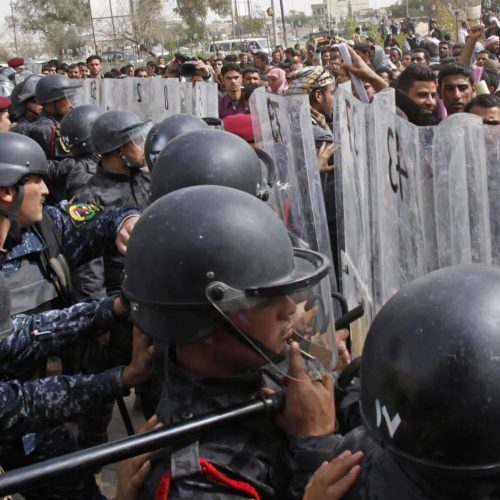Introduction
The $61.45 billion reconstruction program in Iraq will undergo a wholesale transition when most U.S. troops depart at the end of the year. Many reconstruction projects currently under the responsibility of the military will be administered by the State Department once troops leave. The latest report by the Special Inspector General for Iraq Reconstruction reveals daunting transition tasks for State: closing reconstruction teams in provincial areas, opening diplomatic posts in volatile regions of Iraq, taking over the police force development and doubling civilian personnel from 8,000 to 17,000.
The increasing dependence on the State Department and contractors comes at a time when the IG has been critical of the Pentagon and State for being incapable of tracking where reconstruction dollars go currently.
These ambitious efforts coincide with a period of instability, in Iraq and across the Middle East. In recent months thousands of Iraqis have protested corruption and lack of services. In addition, the Iraqi Security Forces personnel have also been targeted more often than usual.
State intends to set up Embassy branch offices across the country, which usually have temporary mission spans of three to five years. The branch offices’ priority, according to State, is to mitigate Arab-Kurd, Sunni- Shia, and provincial tensions. These branches will face centuries-old conflicts and ambivalent attitudes towards the U.S. coupled with the challenges of short-mission length and low staffing levels.
An October 2010 report by the State inspector general noted that “it appears that provincial staffing is now being driven by budget constraints, rather than an appraisal of what is needed to accomplish the mission; certainly there is no indication that the missions have been redefined or reduced as funding and staffing projections shrink.”
The Office of Provincial Affairs manages provincial reconstruction teams at the Baghdad Embassy. These teams have worked to build provincial governments, mitigate conflicts and help local populations start reconstruction projects. The closures of the 14 sites will greatly reduce U.S. presence in rural regions.
With the closing of the OPA at the Embassy, it must transfer 117 tasks to other sections of the Embassy to different offices. So far, only 13 tasks have been transferred. The Baghdad Embassy could not provide details on what tasks remain to be transferred and noted that the tasks other Embassy sections will assume from the OPA is only an estimation.
State already oversees contracts worth hundreds of millions of dollars, but will take on additional contract oversight once the military leaves. “It will be critical for Department of State to have in place effective management and controls to ensure that U.S. funds are effectively and efficiently spent,” the inspector general said.
State, DOD and USAID have come under Congressional criticism for being unable to determine an exact number of contractors employed in Iraq. In the past two quarters, U.S. Embassy-Baghdad has reported to SIGIR that it does not keep data on what activities its contractors provide in Iraq and could not provide a projection of contractor requirements for the upcoming year.
Contracting out security has introduced especially high risks that may worsen when U.S. troops leave, since they currently provide security and oversee security contracts. There is some disagreement within State regarding what government activities should not be contracted out, such as hostage rescue and improvised explosive device (IED) clearance.
The Congressional Research Service noted that many high-profile contractor abuses in Iraq were committed by private security contractors working for State, not the Pentagon. This includes the alleged shooting of Iraqi civilians by Triple Canopy personnel and the shooting of 17 Iraqi civilians in Nisoor Square by Blackwater personnel. The Baghdad Embassy plans on hiring 200 security officers to oversee private security contractors, at a ratio of 1:35.
On top of mounting responsibility, U.S. Embassy-Baghdad faces serious resource constraints. The most recent budget bill passed by Congress slashed State’s budget by $8 billion.
In a letter to the House Appropriations Committee, Secretary of State Hillary Clinton noted that the cuts to State’s budget request “occur at exactly the most sensitive juncture as we transition from [a] military-lead to civilian-run programs and operations.”
FAST FACT: The U.S. has spent an average of $17 million per day over the past eight years on the Iraq reconstruction effort.


Join the conversation
Show Comments